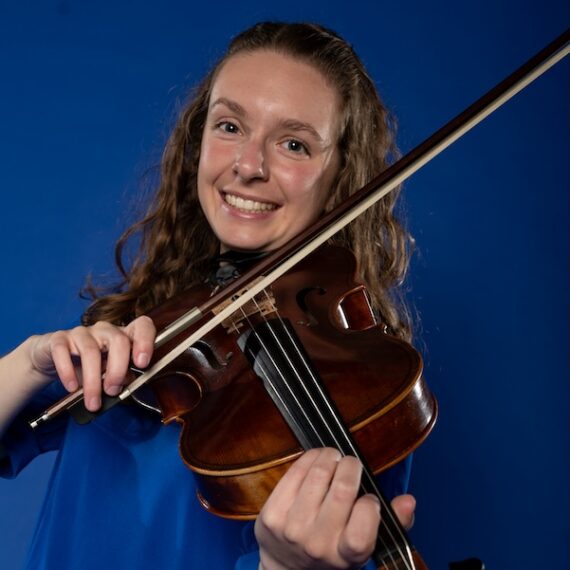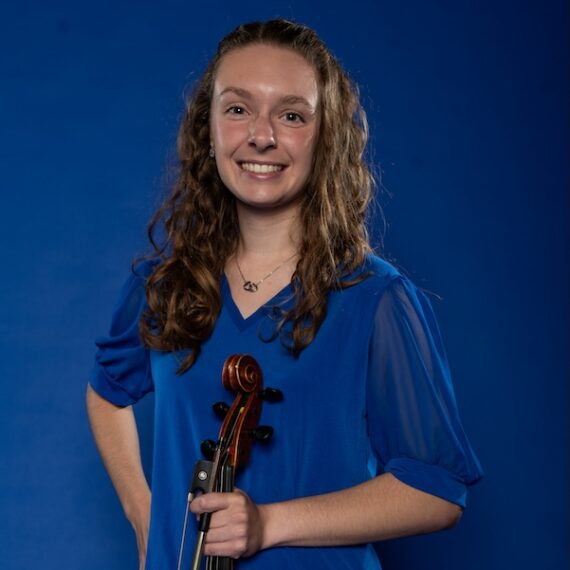Awards/Competitions
1st Place, 2017 Baltimore Symphony Orchestra Young Soloist Competition
Appearances
Chautauqua Summer Music Institute, 2024; Dali Quartet Festival, 2023; Green Mountain Summer Music Festival, 2022; Credo Music Festival, 2021
What is your earliest memory of classical music?
When I was really young, I would always ask my grandparents to play their instruments when I visited. My grandmother is a pianist and my grandfather plays banjo, mandolin, hammered dulcimer, and fiddle. I was then offered the choice of string instruments in the third grade, and I remember looking at the list and saying, “I don’t know what the viola is, but I want to try it!”
Was there a teacher who was particularly impactful/helpful? What made this instructor stand out?
All of my teachers stood out to me for different reasons and each shaped my playing in a unique way. The first memorable instance was when my middle school teacher suggested I join a youth orchestra to help push me beyond the classroom. That youth orchestra introduced me to playing in full orchestras with great repertoire and started my private lessons. My undergraduate teacher, Elias Goldstein, helped develop my technique and provide a solid foundation for my career. My graduate teacher, Ann Marie Brink, continued to develop my technique and prepare for orchestra auditions.
What made you decide to become a musician? Was there a particular performance or person that influenced your decision?
From when I first started playing viola, I knew that music would be my profession. My family, friends, and I all assumed that I would pursue music in higher education and as a career.
How did you hear about TŌN? What inspired you to apply?
I saw advertisements for TŌN, and after reading about the program on their website, I decided to apply. I felt it was exactly the type of program that could offer me what I needed to be successful as a musician and I am excited about what the program has to offer and to see my growth over the next two years.
How would you like to see orchestra concerts evolve in the future?
While there are a lot of different types of concerts and many different orchestras, making concerts more accessible to kids and students would have the greatest impact. We cannot have professional orchestras without youth orchestras, so continuing to inspire the younger generation is crucial.
What is the most memorable performance you ever had?
When I performed a solo with the Baltimore Symphony Orchestra in high school, it was so heartwarming when the entire viola section greeted me after the concert. They told me how great it was to finally have a violist win and we took a group picture at the end.
Can you share any memorable onstage mishaps?
For my very first technique jury I played Novácek’s Perpetuum Mobile. After I started playing, I realized I did not set out all of my pages (four pages with zero rests to turn pages). I had practiced it from memory thankfully but one of the comments I received from the faculty was that it should have been performed from memory even though most of it was.
What is a surprising part of playing your instrument that you think most people don’t know?
The viola is an instrument that most people do not know in general. It rarely gets a solo spotlight and there are so few pieces that highlight it in an orchestra. However, violists are some of the best people you could ever meet and it is such a tight-knit group of people who are so nice and encouraging.
What is the biggest challenge and/or surprise about playing in an orchestra?
One of my biggest challenges while playing in an orchestra is having to perform a piece that I have already played before with a new conductor and a new interpretation. It can be difficult to relearn something while hearing it the way I previously learned.
What advice would you give your younger self or anyone starting out?
Play music you enjoy and improvise in your free time. You can learn a lot about yourself and your instrument when improvising, and mistakes don’t matter.



